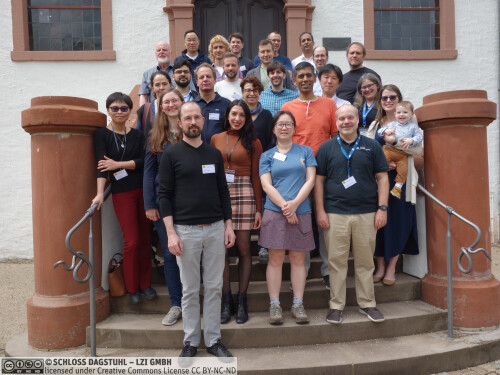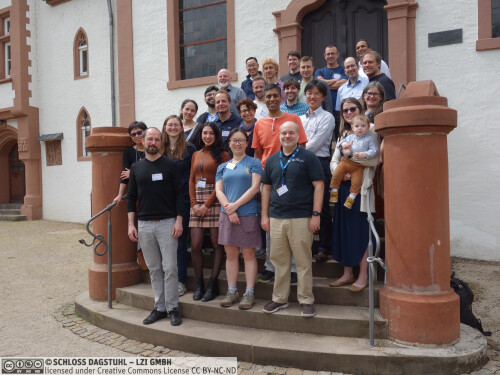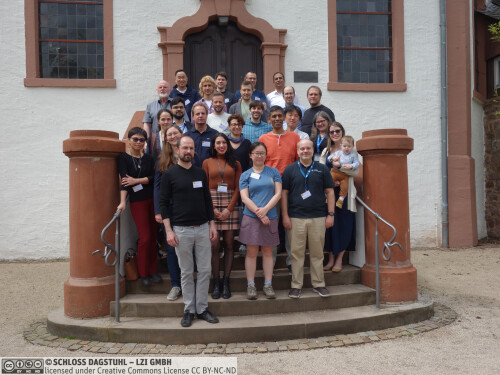Dagstuhl Seminar 23192
Topological Data Analysis and Applications
( May 07 – May 12, 2023 )
Permalink
Organizers
- Ulrich Bauer (TU München, DE)
- Vijay Natarajan (Indian Institute of Science - Bangalore, IN)
- Bei Wang Phillips (University of Utah - Salt Lake City, US)
Contact
- Marsha Kleinbauer (for scientific matters)
- Christina Schwarz (for administrative matters)
Impacts
- Probabilistic Analysis of Multiparameter Persistence Decompositions - Alonso, Ángel Javier; Kerber, Michael; Skraba, Primoz - Cornell University : arXiv.org, 2024. - 19 pp..
- Tagged barcodes for the topological analysis of gradient-like vector fields - Bannwart, Clemens; Landi, Claudia - Cornell University : arXiv.org, 2024. - 36 pp..
Schedule
This Dagstuhl Seminar titled “Topology, Computation, and Data Analysis” brought together researchers in mathematics, computer science, and visualization to engage in active discussions on theoretical, computational, practical, and application aspects of topology for data analysis.
Context
Topology is considered one of the most prominent research fields in mathematics. It is concerned with the properties of a space that are preserved under continuous deformations and provides abstract representations of the space and functions defined on the space. The modern field of topological data analysis (TDA) plays an essential role in connecting mathematical theories to practice. It uses stable topological descriptors as summaries of data, separating features from noise in a robust way. The seminar brought together researchers from mathematics, computer science, and application domains (e.g., materials science, neuroscience, and biology) to accelerate emerging research directions and inspire new ones in the field of TDA.
Goals
The Dagstuhl Seminars 17292 (July 2017) and 19212 (May 2019) were successful in enabling close interaction between researchers from diverse backgrounds. The attendees consistently remarked about the benefits of building bridges between the two communities. The goals from the previous seminars were to strengthen existing ties, establish new ones, identify challenges that require the two communities to work together, and establish mechanisms for increased communication and transfer of results from one to the other. A key goal of the current seminar was to additionally bring in experts from a few application domains to provide the necessary context for identifying research problems in topological data analysis and visualization. Furthermore, we also encouraged interaction between researchers who worked within the same community to identify challenging problems in the area and to establish new collaborations.
Topics
The research topics, listed below, reflect highly active and emerging areas in TDA. They were chosen to span topics in theory, algorithms, and applications.
Multivariate data analysis. Topics include theoretical studies of multivariate topological descriptors (including multiparameter persistence), efficient algorithms for computing and comparing them, formal guarantees for data analysis based on such comparisons, and the development of practical tools based on such analysis. Combining topological analysis together with statistical learning-based methods were also of interest.
Geometry and topology of metric spaces. A cornerstone of TDA is the study of metric and geometric data sets by means of filtrations of geometric complexes, formed by connecting subsets of the data points according to some proximity parameter. The study of such filtrations using homology leads to a multi-scale descriptor of the data that combines geometric and topological aspects of its shape. Besides their use in TDA, geometric complexes also play an important role in geometric group theory and metric geometry. The results and insights from both areas carry great promise for mutual interactions, leading to a unified view on computational and theoretical aspects.
Applications. TDA is an emerging area in exploratory data analysis and has received growing interest and notable successes with an expanding research community. The application of topological techniques to large and complex data has opened new opportunities in science, engineering, and business intelligence. This seminar focused on a few key application areas, including material sciences, neuroscience, and biology.
Parallel and distributed computation. The computational challenges in TDA call for the use of advanced techniques of high-performance computing, including parallel, distributed, and GPU-based software. Many of the core methods of TDA, including persistent homology, mapper, merge trees, and contour trees, have received implementations beyond serial computing, and the interest in utilizing modern state-of-the-art techniques continues unabated. The task of optimizing algorithms in TDA is not only a question of engineering. Many of the key insights leading to breakthrough improvements are based on a careful utilization of theoretical properties and insights.
Participants, schedule, and organization
While welcoming theoretical talks, the attendees were strongly encouraged to prepare a talk that is rooted in applications. The aim was to foster discussions on topics and projects related to practical applications of topological analysis and visualization. The program for the week consisted of talks of different lengths, breakout sessions, and summary / discussion sessions with all participants. We scheduled a total of six long talks (35 minutes + 10 minutes Q&A) on Day-1 and the morning session of Day-2, each providing an introduction either to one of the four chosen topics of the seminar or to a specific application domain. The talks were given by Yasu Hiraoka (Curse of dimensionality in persistence diagrams), Manish Saggar (Precision dynamical mapping to anchor psychiatric diagnosis into biology), Andreas Ott (Topological data analysis and coronavirus evolution), Kelin Xia (Mathematical AI for molecular data analysis), Gunther Weber (Topological analysis for exascale computing: challenges & approaches), and Facundo Mémoli (Some recent results about Vietoris-Rips persistence). Short research talks (16 total, 15 minutes + 10 minutes Q&A) were scheduled during the morning sessions of Day-2 through Day-5.
The afternoon sessions were devoted to discussions, working groups, and interactions. On Monday, we led an open problem session where participants identified different open problems and future directions for research. This initial discussion helped identify working groups and topics for discussion during the week. We organized breakout sessions on Tuesday and Thursday. On Tuesday, after a quick discussion regarding discussion topics, we identified four topics of interest. Participants chose one of the four groups> the curse of dimensionality, distances on Morse and Morse-Smale complexes, computation of generalized persistence diagrams, Codistortion and Gromov–Hausdorff distance. After a quick discussion, we decided to continue discussions on the four topics on Thursday, and some participants chose to join a different group.
We organized an excursion to Trier on Wednesday afternoon followed by dinner at a restaurant. Many participants attended the guided tour and the dinner.
All working groups summarized the discussion during their breakout sessions and presented it to all participants on Thursday evening and Friday morning. These summary sessions were also interactive and resulted in follow-up discussions between smaller groups of participants. We organized a final discussion and feedback session on Friday morning to close the seminar and to make future plans.
Results and reflection
The schedule for the first day helped initiate interaction between participants and continue the discussions during the week. While the introductory talks provided sufficient details on interesting application domains, the open problem session allowed many participants to quickly pose topics of interest. In particular, the format of this session extended beyond proposing specific stated open problems, asking also for contributions, discussion points, and thoughts that would not typically be brought up in such a session. This resulted in a very lively and engaging discussion that encouraged participants to share their perspectives on important current and future research directions.
In summary, we think that the seminar was successful in achieving the objective of encouraging discussions and interaction between researchers with backgrounds in mathematics, computer science, and application domains who are interested in the areas of topological data analysis and visualization. It helped identify new directions for research and has hopefully sparked the engagement of researchers from one community into the activities and research workshops and venues of the other. We strongly believe that the seminar provided a highly valuable contribution to bridging the gap between theory and applications in TDA.
The participants were highly appreciative of the balance between theoretical and applied topics and between the participants and those who presented during the week. They highlighted that the diverse group of participants sharing a strong interest in novel perspectives and exchange of ideas made the workshop an exceptional experience. Several felt that the discussions helped them identify topics for future research or introduced them to new collaboration possibilities.
 Vijay Natarajan, Ulrich Bauer, and Bei Wang
Vijay Natarajan, Ulrich Bauer, and Bei Wang
Topology is considered one of the most prominent research fields in mathematics. It is concerned with the properties of a space that are preserved under continuous deformations and provides abstract representations of the space and functions defined on the space. The modern field of topological data analysis (TDA) plays an essential role in connecting mathematical theories to practice. It uses stable topological descriptors as summaries of data, separating features from noise in a robust way. This Dagstuhl Seminar aims to bring together researchers from mathematics, computer science, and application domains (e.g., materials science, neuroscience, and biology) to accelerate emerging research directions and inspire new ones in the field of TDA.
The research topics, listed below, reflect highly active and emerging areas in TDA. They are chosen to span topics in theory, algorithms, and applications. The invitees are chosen based on their background in mathematics, computer science, and application domains. While theoretical talks are welcome, the attendees are strongly encouraged to prepare a talk that is rooted in applications.
Multivariate data analysis. Topics include theoretical studies of multivariate topological descriptors (including multiparameter persistence), efficient algorithms for computing and comparing them, formal guarantees for data analysis based on such comparisons, and the development of practical tools based on such analysis. Combining topological analysis together with statistical learning-based methods will also be of interest.
Geometry and topology of metric spaces. A cornerstone of TDA is the study of metric and geometric data sets by means of filtrations of geometric complexes, formed by connecting subsets of the data points according to some proximity parameter. The study of such filtrations using homology leads to a multi-scale descriptor of the data that combines geometric and topological aspects of its shape. Besides their use in TDA, geometric complexes also play an important role in geometric group theory and metric geometry. The results and insights from both areas carry great promise for mutual interactions, leading to a unified view on computational and theoretical aspects.
Applications. TDA is an emerging area in exploratory data analysis and has received growing interest and notable successes with an expanding research community. The application of topological techniques to large and complex data has opened new opportunities in science, engineering, and business intelligence. This seminar will focus on a few key application areas, including material sciences, neuroscience, and biology.
Parallel and distributed computation. The computational challenges in TDA call for the use of advanced techniques of high-performance computing, including parallel, distributed, and GPU-based software. Many of the core methods of TDA, including persistent homology, mapper, merge trees, and contour trees, have received implementations beyond serial computing, and the interest in utilizing modern state-of-the-art techniques continues unabated. The task of optimizing algorithms in TDA is not only a question of engineering. Many of the key insights leading to breakthrough improvements are based on a careful utilization of theoretical properties and insights.
 Ulrich Bauer, Vijay Natarajan, and Bei Wang
Ulrich Bauer, Vijay Natarajan, and Bei Wang
- Ulrich Bauer (TU München, DE) [dblp]
- Talha Bin Masood (Linköping University, SE) [dblp]
- Ximena Fernández (Durham University, GB) [dblp]
- Hans Hagen (RPTU - Kaiserslautern, DE) [dblp]
- Teresa Heiss (IST Austria - Klosterneuburg, AT) [dblp]
- Yasuaki Hiraoka (Kyoto University, JP) [dblp]
- Ingrid Hotz (Linköping University, SE) [dblp]
- Michael Kerber (TU Graz, AT) [dblp]
- Claudia Landi (University of Modena, IT) [dblp]
- Michael Lesnick (University at Albany, US) [dblp]
- Joshua A. Levine (University of Arizona - Tucson, US) [dblp]
- Facundo Memoli (Ohio State University - Columbus, US) [dblp]
- Dmitriy Morozov (Lawrence Berkeley National Laboratory, US) [dblp]
- Vijay Natarajan (Indian Institute of Science - Bangalore, IN) [dblp]
- Andreas Ott (KIT - Karlsruher Institut für Technologie, DE) [dblp]
- Manish Saggar (Stanford University, US) [dblp]
- Dominik Schindler (Imperial College London, GB) [dblp]
- Primoz Skraba (Queen Mary University of London, GB & Jožef Stefan Institute - Ljubljana, SI) [dblp]
- Nico Stucki (TU München, DE)
- Yusu Wang (University of California, San Diego - La Jolla, US) [dblp]
- Bei Wang Phillips (University of Utah - Salt Lake City, US) [dblp]
- Gunther Weber (Lawrence Berkeley National Laboratory, US) [dblp]
- Erin Moriarty Wolf Chambers (St. Louis University, US) [dblp]
- Kelin Xia (Nanyang TU - Singapore, SG) [dblp]
- Lori Ziegelmeier (Macalester College - St. Paul, US) [dblp]
Related Seminars
Classification
- Computational Geometry
- Data Structures and Algorithms
- Discrete Mathematics
Keywords
- Topological Data Analysis
- Computational Topology
- Algorithms
- Applications
- Visualization




 Creative Commons BY 4.0
Creative Commons BY 4.0
